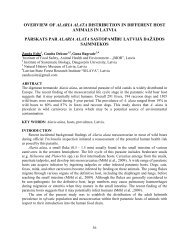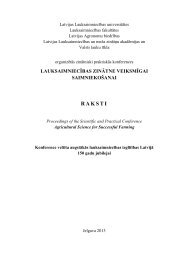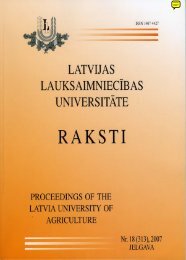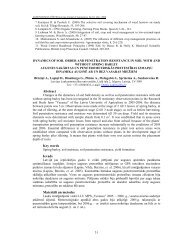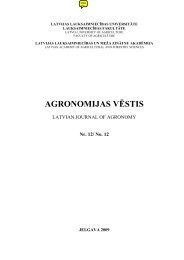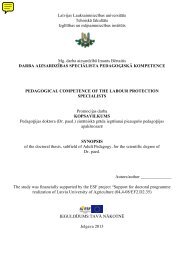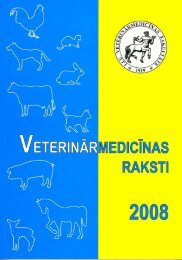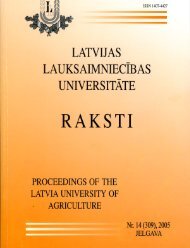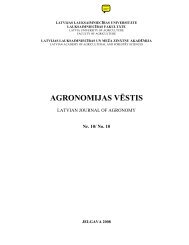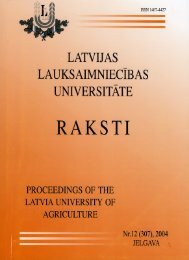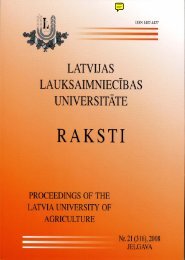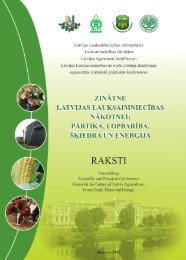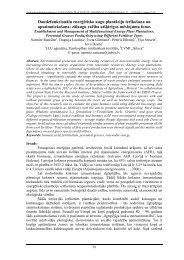Latvia University of Agriculture - Latvijas Lauksaimniecības ...
Latvia University of Agriculture - Latvijas Lauksaimniecības ...
Latvia University of Agriculture - Latvijas Lauksaimniecības ...
You also want an ePaper? Increase the reach of your titles
YUMPU automatically turns print PDFs into web optimized ePapers that Google loves.
D. Kārkliņa et al. Research at the Faculty <strong>of</strong> Food Technologylatest projects is the international EUREKA project “Application <strong>of</strong> antimicrobial lactic acidsourdough in bread production”; project leader – assistant pr<strong>of</strong>essor D. Kunkulberga.Research Facilities at the Faculty <strong>of</strong> Food TechnologyDuring the last decade, modern equipment and measuring devices have beenpurchased thanks to the support from various European funds and other financialresources.The financing from the European Regional Development Fund (ERDF) was obtainedfor arrangement <strong>of</strong> the Packaging Material Property Testing Laboratory, and the <strong>of</strong>ficialopening <strong>of</strong> the renovated and well-equipped laboratory was held in May, 2005. In LLU itwas the first laboratory which was arranged and modernized with the support from ERDFand the European Social Fund (ESF). The Faculty staff appreciates greatly such a benefitwhich allows performing research at an advanced and up-to-date level. The Laboratorywas created with the aim to modernize the process <strong>of</strong> PhD studies in food science, andis mainly used by PhD students in their research work.The Microbiology Research Laboratory is another newly equipped facility arrangedthanks to the support from the Ministry <strong>of</strong> Economics <strong>of</strong> <strong>Latvia</strong> within the project“Establishment <strong>of</strong> laboratory <strong>of</strong> material radioactivity and hygiene”. The Laboratory issuitable for studies in two directions: evaluation <strong>of</strong> microbial contamination <strong>of</strong> variousfoods, and studies in food microstructure.The internal projects <strong>of</strong> LLU support the improvement <strong>of</strong> its infrastructure, and therecently installed Laboratory <strong>of</strong> Bread Technology is one <strong>of</strong> the examples. The maininitiators <strong>of</strong> the establishment <strong>of</strong> this laboratory were assistant pr<strong>of</strong>essors D. Kunkulbergaand D. Kļava. In the Department <strong>of</strong> Food Technology, “a bakers’ team” is created – fiveyoung researchers joined their efforts to do extensive research into bread quality andrelated topics.The Sensory Laboratory is in use already for several years, and its organizer isassistant pr<strong>of</strong>essor E. Strautniece. Always when research is dealing with the developmentor storage <strong>of</strong> a new product, sensory analysis is applied. In the Laboratory, sensoryevaluation is done by undergraduate, Master degree and PhD students whenever theirstudies relate to taste, flavour or texture <strong>of</strong> a product.The Department <strong>of</strong> Chemistry received a contribution from the State <strong>of</strong> Nordrhein-Westfalen in Germany – the Laboratory <strong>of</strong> Water Analysis which is provided with modernanalytical equipment (UV/VIS spectrometer, photometer-microprocessor, thermoreactor,CSB-COD reactor, pH-ionometer, turbidimeter, pH-mVmeters, conductometer, oxymeters,etc.). In the Laboratory it is possible to determine more than 40 different chemical andphysico-chemical parameters <strong>of</strong> water: content <strong>of</strong> different ions, pH, redoxpotential,conductivity, turbidity and colour, content <strong>of</strong> oxygen, the chemical and biological oxygendemand, and contamination with organic substances. The laboratory equipment canalso be used for quality evaluation (composition, physico-chemical parameters and theirchanges during storage) <strong>of</strong> different food products and drinks.Besides, thanks to the funds obtained from the EU and LLU projects, the Department<strong>of</strong> Chemistry purchased and improved the Scientific Laboratory <strong>of</strong> Chemistry <strong>of</strong> NaturalSubstances by equipping it with modern analytical equipment, <strong>of</strong> which the main and mostrelevant is the high pressure liquid chromatograph. As a result <strong>of</strong> the work <strong>of</strong> researchersand young scientists, several methodologies have been created for determining variousparameters (e.g. carbohydrate content in honey, juices, beer, etc.) in food productsusing a high-pressure liquid chromatography, the content <strong>of</strong> hydroxymethilfurfural(HMF), vitamin B 2content in bread, beer, etc., as well as vitamin E content in oils. Todetermine the content <strong>of</strong> various vitamins in food products, the fluorimeter is used, butthe proline content, activity <strong>of</strong> invertase and amylase in honey are determined with thespectrophotometer. The refractometer is used to determine the dry matter <strong>of</strong> juices andto assess the water content in honey; the polarimeter is used for analysis <strong>of</strong> differentsugar solutions. Laboratory equipment (gas analyzer) allows assessing the content <strong>of</strong>different gases (O 2, CO 2) in s<strong>of</strong>t drinks.ConclusionsThe research results <strong>of</strong> the last decade have shown that there are many youngknowledgeable and talented researchers at the Faculty <strong>of</strong> Food Technology.The European Social Fund grants, the purchased modern equipment and measuringdevices, creative cooperation between PhD students and their supervisors, as well as<strong>Latvia</strong> <strong>University</strong> <strong>of</strong> <strong>Agriculture</strong> – 70, 2009 69



